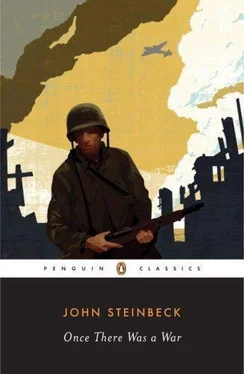John Steinbeck - Once there was a war
Здесь есть возможность читать онлайн «John Steinbeck - Once there was a war» весь текст электронной книги совершенно бесплатно (целиком полную версию без сокращений). В некоторых случаях можно слушать аудио, скачать через торрент в формате fb2 и присутствует краткое содержание. Город: New York, Год выпуска: 1960, Издательство: Bantam Books, Жанр: Классическая проза, на английском языке. Описание произведения, (предисловие) а так же отзывы посетителей доступны на портале библиотеки ЛибКат.
- Название:Once there was a war
- Автор:
- Издательство:Bantam Books
- Жанр:
- Год:1960
- Город:New York
- ISBN:нет данных
- Рейтинг книги:3 / 5. Голосов: 1
-
Избранное:Добавить в избранное
- Отзывы:
-
Ваша оценка:
- 60
- 1
- 2
- 3
- 4
- 5
Once there was a war: краткое содержание, описание и аннотация
Предлагаем к чтению аннотацию, описание, краткое содержание или предисловие (зависит от того, что написал сам автор книги «Once there was a war»). Если вы не нашли необходимую информацию о книге — напишите в комментариях, мы постараемся отыскать её.
Once there was a war — читать онлайн бесплатно полную книгу (весь текст) целиком
Ниже представлен текст книги, разбитый по страницам. Система сохранения места последней прочитанной страницы, позволяет с удобством читать онлайн бесплатно книгу «Once there was a war», без необходимости каждый раз заново искать на чём Вы остановились. Поставьте закладку, и сможете в любой момент перейти на страницу, на которой закончили чтение.
Интервал:
Закладка:
She looked at him sternly. “And how long will that take to get to Australia?” she demanded.
“Oh, I don’t know. A few weeks.”
“N-o-o-o,” she cried, and she began to dance again, little dainty dancing steps, with her arms held slightly out from her sides and her wrists bent down. Her shrill little bird voice laughed and her pale old eyes were wet. “Why,” she cried. “Why, that will be more fun than tea.”
SEA WARFARE
SOMEWHERE IN THE MEDITERRANEAN WAR THEATER, October 19, 1943—
The plans for Task Force X were nearly complete. The officers had coffee in a restaurant in a North African city. The tall, nervous one, a lieutenant commander and a student of mines — contact, magnetic, and those vibration mines which react to the engine of a ship — leaned over the table.
“I conceive naval warfare to be much like chamber music,” he said. “Thirty-caliber machine guns, those are the violins, the fifties are the violas, six-inch guns are perfect cellos.”
He looked a little sad. “I’ve never had sixteen-inch guns to compose with. I have never had any bass.” He leaned back in his chair. “The composition — the tactics of chamber music — are much the same as a well-conceived and planned naval engagement. Destroyers out, why, that will be the statement of theme, the screening attack, and all preparing for the great statement of the battleships.” He leaned back farther and tipped his chair against the wall and hooked his heels over the lower rung.
A lieutenant (j.g.) laughed. “He always talks like that. If he didn’t know so much about mines we would think he was crazy.”
“You haven’t been in battle, in a good naval engagement, and you don’t know anything about chamber music,” said the lieutenant commander. “I’ll show you something tonight if you’ll go with me.”
The jeep moved through the blackout. The streets of the city were fined with military trucks and heavy equipment, all moving toward the harbor where the ships were loading for Italy. The jeep, running counter to the traffic, climbed the hill and went over the ridge and into the valley on the other side, into a valley which had at one time been a place of vineyards and small country houses. But now it was a vast storage ground for shells and trucks and tanks, lined and stacked and parked, waiting to get aboard the ships for Italy. The moon lighted the masses of material getting ready for war.
“Where are you taking us?” the lieutenant asked.
“You’ll see. Just be patient.”
The jeep pulled up to a very white wall that extended off into the distance and disappeared into the pearly in-definiteness of the moonlight. A high gate of iron bars and spikes opened in the wall. The lieutenant commander went to the gate and pulled a rope that hung there, and a small bell called softly. In a moment a white-robed figure appeared at the gate, a tall man with a long, dark beard.
“Yes?” he asked softly.
“May we come in?” the lieutenant commander asked. “May we come in for evensong?”
“Yes. of course,” the brother said. He pulled at one side of the gate and the hinges cried a little.
Inside the wall was a lovely garden in the moonlight. No war material at all. Everything was cut out except flowers and the little sound of running water and the thick outline of a sturdy church against a luminous sky. The lieutenant (j.g.) said, “You speak very good English.”
“I should,” said the brother. “I was born in Massachusetts.”
“American?”
“We come from all over. We have Germans and French, and even a Chinese. Some Russians, too.”
The party moved slowly up the path and came to the little fountain which made the dripping sound and put a cool emphasis on a hot night. “The song has already started,” the brother said. “Walk quietly.”
The way went among the walls of flowering shrubs and then up two outside steps, and then into a dark hallway, and finally through an entrance into a place that was familiar and strange. Over the rail and below was the body of the church, only you could not see it, for only one candle was burning, and it merely suggested the size and height. It picked out a corner and an arch and a point of gold, and your mind filled in the rest. Lined below, just visible, were the rows of the white brothers. And then their voices came softly and swelling, singing the ancient music, the disembodied and unimpassioned music, of which Mozart said he would rather have written one chant than all his own. The evensong rose higher and higher, and it was rather like the dimness of the arched roof overhead. The great, vague room swelled and pulsed with the sound, and then it died and one single voice took it up and the others joined in and the candle flame darted about on its wick.
The sound of the trucks and the half-tracks and the pound of the tanks came vaguely from the distance and the music rose to a high note and stopped. The lines of white figures filed slowly out and a hand came into the candlelight and pinched out the flame.
The jeep went back into the city, and this time it went very slowly because it was caught between a weapons carrier and a troop truck loaded with sleepy, upright soldiers who swayed when the truck struck a rough stretch of street.
The lieutenant (j.g.) was very quiet. Some paradox worried him. He said, “The change from one thing to another was too quick. There was no time to get used to it. You should have time to get used to things like that.”
“There was actually no change,” the lieutenant commander said. “I’ve always thought that naval warfare was composed like chamber music. There wasn’t any change. You just saw two sides of the same thing. You can’t make islands of experiences. They relate just exactly as the strings relate in a quartet. Maybe you’ll see in a day or two when we get into action. You haven’t been in action, have you?”
THE WORRIED BARTENDER
SOMEWHERE IN THE MEDITERRANEAN WAR THEATER, October 20, 1943 —
When our small American force had captured the island of Capri with no resistance whatsoever on its part or on ours, it was only natural that sooner or later we should meet Luigi the bartender. Luigi had kept warm during the whole war a love of Americans based, he freely admitted, on a memory of tips in the nicer days when American tourists came to bathe in the Blue Grotto and the pink wine. When sailors and officers from the little force inspected the defenses of Luigi’s bar and found them formidable. Luigi was cordial but sad. He spoke the English we know, the English of the banana pushcarts and the pizzerias, of the spaghetti joints and grind organs. Luigi’s dialect sounded like home.
Luigi was gay but sad. His joy had a habit of falling off in the middle and dissipating. One afternoon, after each one of us had tried to remember a man named Giuseppe Marinari, of Gary, Indiana, who was Luigi’s third cousin, we inquired into his sadness. And only then did his trouble come out with a rush.
It seemed that Luigi had a daughter and, more than that, he had an incipient grandchild. But this daughter and this expectation were across the little stretch of water in Castellammare. And what was worse, the Germans were moving up on Castellammare and we were not there in enough force either to repel or to intercept them. Consequently it seemed that Luigi’s daughter was very likely to have her child in a shell hole, illuminated by star shells and parachute flares and possibly speeded up by bomb bursts. Luigi was worried and upset because, he explained, it was not as though he had other daughters or grandchildren. This was his sole chick, due to some misfortune or deformity, the reason for which was known only to God. And as Luigi poured out his story he also poured out Scotch whisky that had been buried in the earth in back of his bar ever since the war started.
Читать дальшеИнтервал:
Закладка:
Похожие книги на «Once there was a war»
Представляем Вашему вниманию похожие книги на «Once there was a war» списком для выбора. Мы отобрали схожую по названию и смыслу литературу в надежде предоставить читателям больше вариантов отыскать новые, интересные, ещё непрочитанные произведения.
Обсуждение, отзывы о книге «Once there was a war» и просто собственные мнения читателей. Оставьте ваши комментарии, напишите, что Вы думаете о произведении, его смысле или главных героях. Укажите что конкретно понравилось, а что нет, и почему Вы так считаете.









